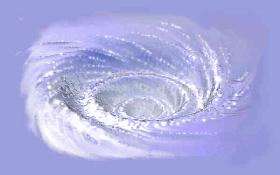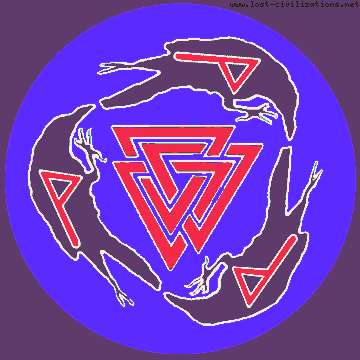The king was so impressed with Leif that he invited Leif to stay in Norway. Leif decided there was no reason to rush back home to Greenland, so he accepted the offer. While in Norway, he marveled at all the wonderful things and rested in the lap of luxury
One day, while playing chess with Leif, King Olaf told him of how he used to also worship the gods Leif did. He also told him of how a plague had struck Norway and how many people had died. Then he told Leif of how he turned away from those gods and began to worship the living Christ. He was baptized along with thousands of Norwegians, and then the plague stopped.
Leif, not being very faithful to the Viking gods, became very interested in Christianity. He finally agreed to be baptized and accept this new faith. On his return voyage, he brought along a priest to spread the Christian faith to Greenland.
Sometime after Leif had returned to Greenland, he became restless. He decided to find the lands to the west of which Bjarni had spoke. So he bought Bjarni’s boat and set off with Thyrker and some men towards the north, following Bjarni’s course. After sailing up the western coast of Greenland, he sailed west for 600 miles and found a land with high glaciers and rock.
They landed, but were disappointed because the land seemed to be one huge slab of rock. Because of this he named it Helluland (Slab Land or Flat Rock Land), which is now believed to be Baffin Island. Leif then sailed south and found another land. When he went ashore he found it to be flat with white beaches and some trees. He named this land Markland (Woodland) which today is believed to be the eastern coast of Canada.
Then Leif sailed southeast for two days and came to an island with a mainland behind it. On this land the dew on the grasses seemed as sweet as honey. Here Leif had some booths or temporary shelters built. But, the land here was so rich that he decided to build at least one large house for the winter. On this land there were salmon bigger than any the Vikings had ever seen before, there were also very rich pastures there for their cattle (they had brought a few), and there were rich forests covering this land.
After the houses were built, Leif sent out an exploration group to explore the land. After one of these expeditions, Thyrker didn’t return. The men searched for him all day and finally found him the next morning. When they found him he was very excited and blabbering in German. After he calmed down he explained to the men that he had found grapes on this land.
Leif ordered his men to load grapes and timber onto the boat, and then they settled in for the winter. But the winter here was very peculiar. No frost came to the grasses. They also noticed that the days and nights were of more equal length here.
When spring came and the men were ready to go, Leif gave this land a name, Vinland, which either means Wineland or Pastureland. We now know Leif’s Vinland to be L’Anse aux Meadows in Newfoundland.
Surprisingly, few people ever returned to Vinland, only Leif’s sister and a small group of settlers who were killed by Indians. Because of this, Europe remained almost totally in the dark about the discovery of this new world. The only references to it are in the Norse sagas where most of the information concerning Leif Erikson is recorded.
– Encyclopedia Britannica
NORSE MYTH

Just north of the most northerly Orkney Island, there is an eddy or whirlpool called the Swelki (from Old Norse svelgr or sea-mill). At the bottom of the sea floor in this spot is a magic mill, and with it are two giantesses, Grotti-Fenni and Grotti-Menni, who grind and grind and grind.
Originally the mill was supposed to grind out good things, but when the giantesses were enslaved and forced to turn the mill, they cursed it to grind nothing but salt. And while they still are enslaved to the mill, to this day it still grinds salt. The legend states that the whirlpool is caused by the waters of the sea, pouring through the grind-stone’s center hole. The Norse called the great whirlpool maelstrom.
NORSE MEDITATION SYMBOL

GODS
LOKI THE TRICKSTER

The most unpredictable and certainly the most dangerous god in the Northern pantheon was Loki. His activities ran from the merely mischievous to the blatantly malicious. Supremely clever, Loki ensnared everyone in complicated problems, to which he always supplied a remedy – through his solution often engendered even greater troubles.
Loki is an immensely powerful magician, and shares with Odin the ability to sex- and shape shift at will. His parents were both giants (the perpetual enemies of the gods) and Loki had some unusual children, including the huge wolf borne from Loki’s brief dalliance with a giantess.
Loki was fair of face, and took many lovers, despite his constant criticism of goddesses who did the same.